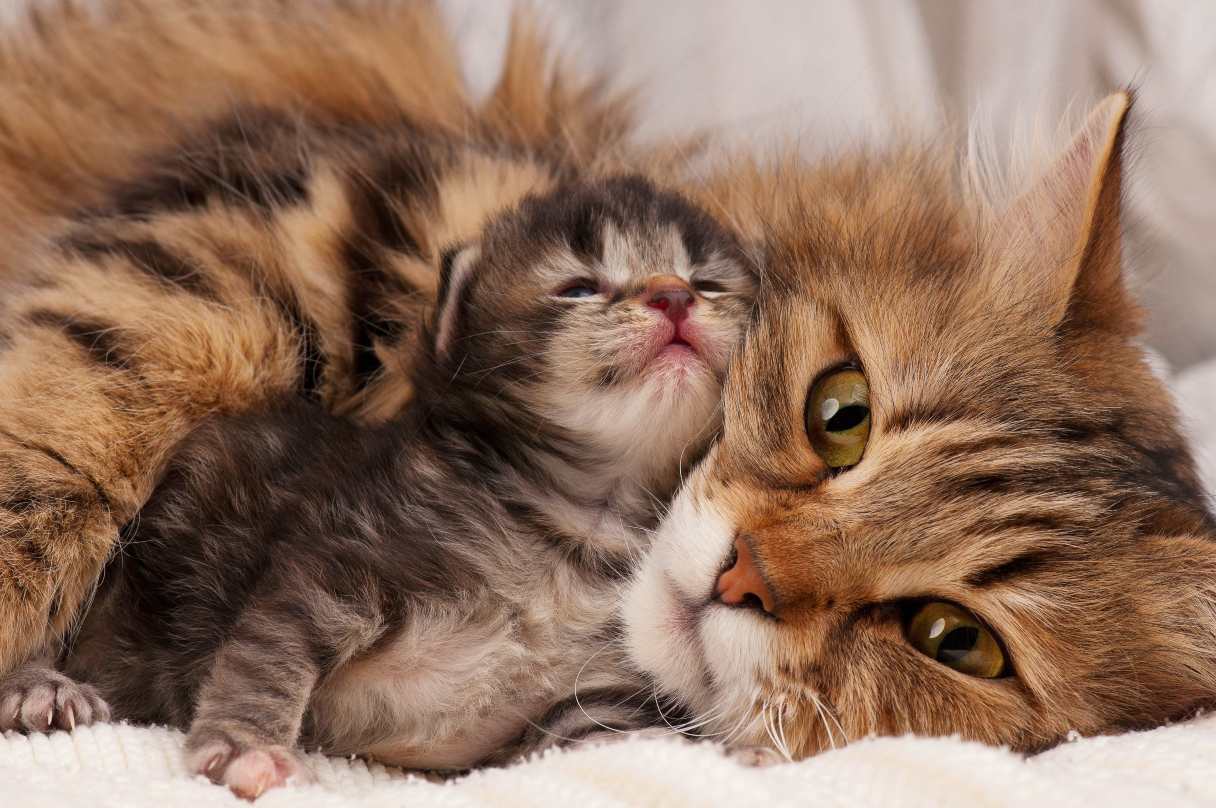Cats can start having kittens as early as 4 months of age, while they are still kittens themselves. If they’re not spayed, they can go into heat as often as every three weeks and have as many as four litters each year. That can result in a lot of kittens needing homes.1
Whether you’re breeding your female cat, you’ve rescued one who’s pregnant or your unspayed kitty gets outside and comes back home with a surprise, you’ll need to know what to expect when your cat is expecting. Read on to learn how long your cat will be pregnant, how much her pregnancy will cost and how to care for her up to and through giving birth.
How Long Are Cats Pregnant?
Gestation is simply a medical synonym for pregnancy — it’s the time it takes for babies, or kittens in this case, to develop from conception to birth.2 In cats, the gestation period is about two months, or eight to 10 weeks.1
The average gestation period for cats is 63 to 65 days, but it can range from 60 to 67 days.2 If it's a cat's first litter, it could be longer.3 In some cases, it can last up to 72 days.1
Kittens born before 60 days are premature and may not survive.3 But they may be saved if they receive intensive care.2
Stages of Cat Pregnancy
Much like a human pregnancy, a cat’s gestation period can be divided into three distinct stages, or trimesters:4
-
First trimester (1 to 21 days). During this stage, it may be hard to tell your kitty is pregnant. You might notice a slight increase in appetite and behavioral changes. You might also see slight swelling of the belly and nipples, but this isn’t likely to be pronounced.3 In addition, some pregnant cats will experience morning sickness during this stage.3
-
Second trimester (22 to 42 days). Physical signs of pregnancy — such as an enlarged tummy, weight gain and swollen and darkened nipples — become more prominent. Any morning sickness your cat experiences should subside.3 This is a good time to take your cat to the vet for a pregnancy test or ultrasound to confirm her pregnancy.
-
Third trimester (43 to 63 days). Your cat’s belly will become so large it’s hard to miss, and she may want to eat all the time. She may also start displaying nesting behaviors in preparation for the arrival of her kittens. She may have sudden bursts of energy and excitement as well.3
How to Tell if Your Cat Is Pregnant
You can typically determine that your cat is pregnant by changes in her physical appearance and behavior. Here are common symptoms of pregnancy in cats, although bear in mind that not all expecting mama kitties will exhibit every symptom:5
-
Enlarged nipples
-
Hiding
-
Increased affection or aggression2
-
Increased appetite
-
Morning sickness3
-
Sleeping more often
-
Sudden bursts of energy3
-
Swollen tummy
-
Weight gain
If you suspect your kitty might be pregnant, it’s best to have a vet examine her to confirm the pregnancy. Typically, they can tell simply by palpating the belly to feel for the presence of fetuses. If your vet thinks your cat might be at least 14 days along, they may recommend an ultrasound to see the number of kittens and check their size and condition.1
If your vet believes it’s late in the pregnancy, they might want to do an X-ray of her abdomen — a safe and effective method of determining the size of the litter and their due date.1
How to Tell if Your Cat Is Ready to Deliver
Cats typically display signs of early labor about a week before they’re ready to give birth. These signs may include:3
-
Decreased rectal temperature
-
Droplets of milk forming on the nipples
-
Preparing a nesting spot
-
Visible movement of the kittens
When it’s time to give birth, your kitty might display these signs:3
-
Bloody vaginal discharge (in the hours leading up to birth)
-
Darkened and enlarged nipples
-
Panting and pacing
-
Body temperature of 100 degrees Fahrenheit
What to Expect During and After Delivery
If all goes well, it should take between 15 and 20 minutes between births for your cat to deliver each kitten.3 However, it’s not uncommon for some cats to take a break between delivering kittens, during which they may nurse the kittens that were already born, eat some food and get some sleep.2 This resting stage can take up to 36 hours.2 If you’re concerned, you should reach out to your vet for advice.
Each kitten will be born covered with an amniotic sac, which the mother will remove by licking them. Her licking stimulates the kittens to start breathing. She will also eat the placenta.3
Once all the kittens have been delivered, you should change their bedding.2 Take the mother and her kittens to see the vet within the first 24 hours.3
Possible Birthing Complications for Cats
While most cats can get through labor and delivery with very little help, some complications may occur. You should monitor the process and contact your emergency vet immediately if any of the following happens:2
-
A kitten can’t be seen beginning to emerge after 10 minutes of intense straining
-
A kitten fails to be born after 20 minutes of intense labor
-
Your cat exhibits pain if you gently pull on a partially delivered kitten
-
Your cat acts lethargic or depressed
-
Your cat has a temperature of more than 103 degrees Fahrenheit
-
Your cat bleeds from her vulva for more than 10 minutes
Average Cost of a Cat Pregnancy
If your kitty is expecting, it’s a good idea to budget for veterinary costs associated with her pregnancy, in addition to her daily expenses. Ideally, your pregnant cat should visit the vet at least twice during her pregnancy: once early on to confirm the pregnancy and check her health, and again toward the end to assess the condition of both her and her kittens.
Costs for veterinary care for your pregnant cat will vary according to several factors, including where you live, your vet’s fees and any tests they recommend, as well as whether there are any pregnancy or birth complications. At her former practice in California, vet expert Dr. Kathy Wiederkehr (Wentworth) typically charged the following for pregnant feline patients:
| Treatment/Procedure | Cost |
|---|---|
| Initial examination | $97 |
| Fecal testing for intestinal parasites | $75 |
| Felv/FIV test (if needed) | $95 |
| Late pregnancy recheck | $65 |
| Standard blood work | $350 |
| Ultrasound | $145 |
| X-rays | $350 |
“If any complications arise, such as a C-section or hospitalization, it can get very expensive,” says Wiederkehr. "Fortunately, most cats have no trouble giving birth."
What Supplies Will I Need to Make My Pregnant Cat Comfortable?
Your cat may try to create her own space to give birth once her nesting instincts kick in.3 But you can help keep her and her kittens comfortable, safe and accessible by supplying a whelping bed — a designated area for giving birth and caring for newborns.2 This can be as simple as a cardboard box lined with old sheets or towels.2 It’s best to place it in a spot where your cat can have some privacy, away from foot traffic, kids and other pets.1
In addition, Dr. Wiederkehr recommends keeping plenty of clean towels on hand, along with a small gram scale for weighing the kittens.
If this is your first cat pregnancy, you might find it a little confusing and nerve-wracking, as well as exciting. However, knowing what to expect and planning for each stage of your cat's pregnancy and delivery will help reduce the chances of complications. This preparation will also enable you to care for and comfort your cat during a time that’s likely just as confusing to her.
CareCredit Credit Card Financing for Cats
Taking good care of your pet's well-being from nose to tail is essential. Make sure to stay up to date on their regular checkups at the vet to help keep your pet happy and healthy for a lifetime of love. You can use your CareCredit credit card for pet care throughout the year for routine veterinary services as well as emergencies and surgeries.* Use our Acceptance Locator to find a veterinarian near you that accepts CareCredit.
CareCredit is there for you and your pet every step of the way. Continue your wellness journey by downloading the CareCredit Mobile App to manage your account, find a provider on the go and easily access the Well U blog for more great articles, podcasts and videos.
In addition to pet care, you can also use your CareCredit credit card for dentistry, cosmetic, vision, hearing, health systems, dermatology, pharmacy purchases, spa treatments and so much more within the CareCredit network. How will you invest in your health and wellness next?
Author Bio
Jean Marie Bauhaus is a freelance writer and novelist who has been writing pet content since 2013. Her work has appeared on Forbes.com, Hill's Pet, Chewy, AKC.org and more.







